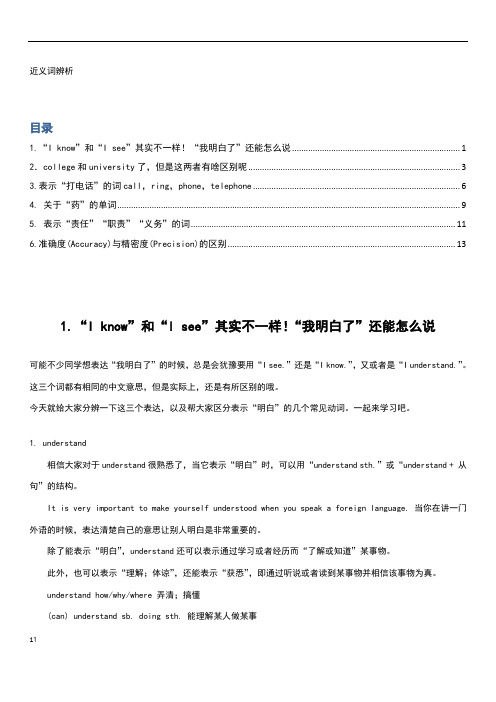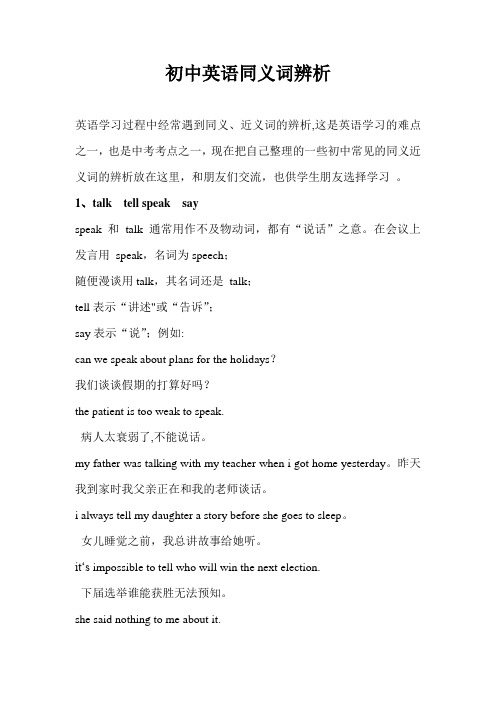英语近义词辨析(动词)
近义词辨析

1 advise, caution, warn, admonish, counsel这些动词均有“劝告、忠告、警告”之意。
advise: 普通用词,泛指劝告,不涉及对方是否听从劝告。
caution: 主要指针对有潜在危险而提出的警告,含小心从事的意味。
warn: 含义与caution相同,但语气较重,尤指重后果。
admonish: 一般指年长者或领导对已犯错误的或有过失的人提出的忠告或警告以避免类似错误。
counsel: 正式用词,语气比advise强一些,侧重指对重要问题提出的劝告、建议或咨询。
2 district, region, area, section, zone, belt, quarter, neighbourhood这些名词均有“地区”之意。
district: 多指由政府等机构出于行政管理等目的而明确划分的地区。
region: 常指地球上、大气中具有自然分界线的区域,特指按照气候、人体或其他特征鲜明、自成一体的地区。
area: 普通用词,指整体中较大的,界线不分明的一部分。
section: 指城市、国家或天然界线形成的地区。
zone: 科技用词,指圆形或弧形地带,尤指地图上按温度划分的五个地带。
用作一般意义时,也可指具有某种特征的其它地区。
belt: 从本义“带,带状物”引申而指任何广阔的长条地带,也可指种植某种作物的地区。
quarter: 指城市里具有相同性质或独特风味的地区,比section范围小,但划分更精确。
neighbourhood: 指比section的划定更清楚,范围更小。
具体指城市中的住宅区,也可指附近一带。
3 part, piece, section, division, portion, fraction, fragment, segment, share 这些名词均可表示“整体的一部分”之意。
part: 含义广,最普通用词,常指整体中可大可小的一部分,也可指整体中可分开的独立部分。
英语近义词辨析

近义词辨析目录1.“I know”和“I see”其实不一样!“我明白了”还能怎么说 (1)2.college和university了,但是这两者有啥区别呢 (3)3.表示“打电话”的词call,ring,phone,telephone (6)4. 关于“药”的单词 (9)5. 表示“责任”“职责”“义务”的词 (11)6.准确度(Accuracy)与精密度(Precision)的区别 (13)1.“I know”和“I see”其实不一样!“我明白了”还能怎么说可能不少同学想表达“我明白了”的时候,总是会犹豫要用“I see.”还是“I know.”,又或者是“I understand.”。
这三个词都有相同的中文意思,但是实际上,还是有所区别的哦。
今天就给大家分辨一下这三个表达,以及帮大家区分表示“明白”的几个常见动词。
一起来学习吧。
1. understand相信大家对于understand很熟悉了,当它表示“明白”时,可以用“understand sth.”或“understand + 从句”的结构。
It is very important to make yourself understood when you speak a foreign language. 当你在讲一门外语的时候,表达清楚自己的意思让别人明白是非常重要的。
除了能表示“明白”,understand还可以表示通过学习或者经历而“了解或知道”某事物。
此外,也可以表示“理解;体谅”,还能表示“获悉”,即通过听说或者读到某事物并相信该事物为真。
understand how/why/where 弄清;搞懂(can) understand sb. doing sth. 能理解某人做某事it is understood (that) 据说...My girlfriend loves me very much, but she cannot understand how crazy I am about music. 我女朋友很爱我,但她就是不能理解我对音乐有多痴迷。
考研英语完型词汇——近义词辨析

考研英语完型词汇——近义词辨析1. adherence&adhesion这两个词都是“粘附的”意思。
adherence 用于比喻的意思。
例如:His adherence to the strict letter of the law.adhesion 是指物质上的。
2. adjacent&adjoining&contiguous这些词都有next to“紧挨”的意思。
adjacent “毗邻的,邻近的”,但它们可能并不相互直接接触。
adjoining和contiguous 指相互接触,通常之间有一个edge或boundary。
3. admission&admittance它们都有“the act of entering”的意思。
但admission 用于公共场合。
例如:The price of admission to the gallery is£5.admittance 不指公共场合,一般指私人的住所。
4. adopted&adoptiveadopted “收养的,过继的”an adopted son(daughter) 养子(女);my adopted country 我所入籍的国家;adopted words 外来语。
adoptive“收养的”,我们说adoptive parents,但很少说adoptive child;“采用的”,“假冒的”an adoptive courage假充勇敢。
5. averse&adverseadverse “不利的,反对的”,用于事,不用于人。
adverse weather conditions;an adverse reaction。
averse “嫌恶的,反对的,不乐意的”,常和“to”一起使用,而且用否定形式。
6. advise&adviceadvise “劝告”(动词);advice “劝告”(名词)。
同等学力申硕考试-英语近义词辨析1

同等学力申硕考试-英语近义词辨析1、abandon, desert, forsake, leave, give up这些动词或词组均含“抛弃、放弃”之意abandon:强调永远或完全放弃或抛弃人或事物等,这可能是被迫的,也可能是自愿的。
desert:着重指违背法律责任和义务,或自己的信仰与誓言的行为,多含非难的意味。
forsake:侧重断绝感情上的依恋,自愿抛弃所喜欢的人或物。
也指抛弃信仰或改掉恶习。
leave:普通用词,指舍弃某事或某一职业,或终止同一某人的关系,但不涉及动机与果。
give up:普通用语,侧重指没有希望或因外界压力而放弃。
2、ability, capacity, capability, genius, talent, competence, faculty, gift, aptitude这些名词均可表示人的“能力,才能”之意。
ability:普通用词,指人先天的或学来的各种能力。
capacity:侧重指人的潜在能力,通常不指体力,多指才智,尤指接受与领悟能力。
capability:多用于人,指胜任某项具体工作的能力,也指本身具有、尚未发挥的潜在能力。
常与of或for连用。
genius:语气最强,指天赋的高度才能与智力。
talent:着重指人某方面具有可发展和倍养的突出天赋才能,但语意比genius弱。
competence:正式用词,侧重指令人满意的业务能力与水平,达到胜任某项工作等的要求。
faculty:指特殊的才能或智力。
gift:着重个人的天赋的才能或在某方面的显著本领,常暗含不能用一般规律作解释的意味。
aptitude:多指先天或后天习得的运用自如的能力,常暗示接受能力强,能迅速掌握一种学术训练或艺术技巧。
3、able, capable, competent这些形容词均含有“有能力的,能干的”之意able:最常用词,多用于褒义,着重指多方面的,经常性的,或潜在性的能力。
初中英语同义词辨析

初中英语同义词辨析英语学习过程中经常遇到同义、近义词的辨析,这是英语学习的难点之一,也是中考考点之一,现在把自己整理的一些初中常见的同义近义词的辨析放在这里,和朋友们交流,也供学生朋友选择学习。
1、talk tell speak sayspeak 和talk 通常用作不及物动词,都有“说话”之意。
在会议上发言用speak,名词为speech;随便漫谈用talk,其名词还是talk;tell表示“讲述"或“告诉”;say表示“说”;例如:can we speak about plans for the holidays?我们谈谈假期的打算好吗?the patient is too weak to speak.病人太衰弱了,不能说话。
my father was talking with my teacher when i got home yesterday。
昨天我到家时我父亲正在和我的老师谈话。
i always tell my daughter a story before she goes to sleep。
女儿睡觉之前,我总讲故事给她听。
it‘s impossible to tell who will win the next election.下届选举谁能获胜无法预知。
she said nothing to me about it.关于这一点,她什么也没有对我讲.*speak 当及物动词用时,宾语一般是语言或词语之类的词。
如: does anyone speak english here?这儿有人会说英语吗?2、good well nicegood 形容词,好的,合适的,新鲜的,擅长的。
well 作形容词时,指"(身体)健康的”;还可用作副词,修饰动词。
nice形容词,美好的,令人愉快的,可爱的,特指取悦感官的事物。
she is good at english。
她擅长英语。
英语a字母开头同义近义词辨析

大纲词汇表以A开头的部分名词、动词的同义、近义词词义辨析一、同义、近义名词考试重点(1)ability capacityability 是指人的“本领,技能;才能”;并且是后天学会的。
如:He has the ability to make a very good ship.他能够制造很好的轮船。
A man of ability 一个有本领、有能力的人capacity 也指人的“能力,才能”,但这种能力常常是与生俱来的,是一种天赋。
She shows a great capacity for learning English。
她显示出了学习英语的天资。
另外,capacity常常表示“装,容纳,收容的能力和数量”,如:The hall has a capacity for 500 people. 这座大厅能容纳500人。
最后,还有“职位、身份”的意思:I am your friend, but in my capacity as an official of the law, I must put your into prison.我是你的朋友,但以一个司法人员的身份,我必须把你投入监狱。
(2) anger , indignationanger指“愤怒,生气”,常因个人受损害或侮辱而引起,含有报复的意味,强调个人内心情感上的反应。
He showed anger at the insult.他因受到侮辱而表示愤怒。
indignation 意为“义愤,愤慨”,指因正义感而发的愤怒,如为残酷、非正义、罪恶等所引起的愤怒。
如:The bombing of undefended cities aroused considerable indignation.轰炸不设防的城市激起了莫大的义愤。
(3)activity, act, actionactivity 表示所参加的具体“活动”,所组织的具体“活动”,所做的“事情”,为可数名词。
英语近义词辨析
英语近义词辨析look gaze stare glare peek peer 都含“看”的意思。
look是常用词, 指“注意或有意识地看”, 如:He looked but saw nothing.他看了, 但什么也没看见。
gaze指“由于惊讶、好奇、喜悦、同情或感兴趣而目不转睛地看”, 如:What are you gazing at?你在凝视什么? stare指“睁大眼睛、目不转睛地盯着看”, 如:It's rude to stare at people.盯着看人不礼貌。
glare指由于“羡幕、恐惧、惊讶或愚蠢而用恐吓、凶狠或愤怒的眼光看”, 如:He glared at her.他向她瞪眼。
peek指“偷看”、“通过孔隙窥视”, 如:You must not peek while you are counting in such games as hide-and-seek.象捉迷藏一类游戏中, 你数数时绝对不能偷看。
peer指“细看”, 如:He was peering down the well.他细看下面的井。
injure,harm,hurt,damage,impair,mar,spoilThese verbs mean to affect detrimentally.这些动词都表示不利地影响。
Injure can refer to acts that have an adverse effect on health, appearance, prospects, or well-being:injure 可以指对健康、外表、前景或生活的舒适带来反面影响:She was badly injured in an accident.她在一次事故中被重伤。
Malicious gossip could injure his chances of success. It can also mean to treat another unjustly or wrongfully: 恶意的流言会危及他成功的希望。
英语四级近义词辨析
近义词:pierce 猛戳、猛插入、猛刺入fierce 激烈的、猛烈的fierce competitionstrained 紧崩的、拉紧的be critical of 对...进行批评、挑剔errors = mistakes/sth. done wronglysteamed bread 馒头fault 错(指人的性格、行为或习惯上的缺点)shortcomings - (反)merits 指在学校中老师作评语时给出的优缺点flaw 指物体或材料上的瑕疵rise和arise都是不及物动词。
raise vt. 提高、提升;饲养、抚养raise the flagraise childrenraise pigsrise 指太阳、旗帜、水位等的上升(具体概念)arise 指抽象概念的一种出现artificial false unnatural unrealartificial 人造的、人为的e.g. artificial legleather 皮革e.g. artificial leatherunnatural 形容人的行为举止不自然;不正常的e.g. a bird of unnatural sizefalse 假的(具有欺骗性的)e.g. false passportfalse hairfalse teethunreal 虚幻的e.g. unreal worldgive present promise grant credit entitle give sb. sth./give sth. to sb.e.g. give me a book/give a book to megrant sb. sth. 正式的授予e.g. He granted me one mao. (错)grant 资助take sth. for granted 把...看作是理所当然entitleentitle sb. to do sth./entitle sb. to sth.credit 学分credit card 信用卡credit A to B 把A归咎于Be.g. credit the car accident to the driver's carelessnesspresent 赠与、给与e.g. present withpromisepromise to dopromise sb. sth.e.g. give me a bookI was given a book.A book was given to me.mild light slight tendermild 温柔的= gentle;吃的东西不辣的spicy 麻辣soft 柔软的e.g. soft drink - hard drinkslight 轻微的、少许的e.g. A slightest change of the schedule may affect everyone. simplest 最最简单的slightest 最轻微的、最少许的leastat least 至少light - (反)heavylight 清淡的、容易消化的tendertend + to 趋向于tender (肉)嫩的laziness idleness povertylaziness - lazy 懒惰poverty - poor 贫穷、穷困inability 无能力idleness 游手好闲idle 闲置(的)e.g. idle capital 闲置资本idle away some time 虚度光阴kill time 消磨时间nuisance worry trouble anxietynuisance 指具体的令人讨厌的东西trouble 指代的是一种problemworry和anxiety都是永陪词汇crash clash smash ash wreck accident spot pollute staincrash 表示飞机的失事wreck 轮船的失事accident 汽车的车祸spoil 宠坏、惯坏injure 在事故中受伤wound (刀、枪等)伤hurt (感情、情感的)伤e.g. You hurt my feelings.My leg hurt.hurt oneself 自残spot 使...有污点;污点、污迹(点状)e.g. spotted dogchip – chopstain 弄脏、染色(片状污迹)debate consult dispute bargaindebate 辩论consult 咨询consultant 顾问dispute 反驳beyond dispute 无可争辩bargain+ with sb. 与某人讨价还价+ about sth. 就...讨价还价答案:Dvalid vain vacant empty vague hollow bare blank valid 具有法律效力的vacant没人占用而空暂时没有充满而空(反)occupiedempty 空空如也的,什么也没有vainin vain 徒劳,白费力气blank 因为没写字而空hollow 中空的、空心的- (反)solidbare 光秃秃的(一般形容土地)bald答案:D动词和动词短语1、turnturn down 将音量关小;拒绝turn up 把音量开大;出现turn out 结果是、证明;生产turn over 移交、转交(没有方向性)turn to 求助于;参考turn in 交给、上交turn on 打开(电视机)look out = be carefultake care 当心、小心make out1、= understand 理解、领悟2、= hard to recognize 费力的辨认出3、开具支票make out a checkgo over1、复习2、仔细检查答案:C2、makemake outmake for 朝...走去make off 匆匆地离开某地、逃走make up组成、构成+ 数字/百分比be made up of 组成、构成(被动)补考缓考make it = succeed in doing sth.make up for 弥补、补偿stick to strike at strive to strive forstuck tostick to(介词)坚持e.g. Stick to the end and you will make it.strove forstrive for 为...而努力e.g. Don't strive for perfection.struck atstrike atcurse at 咒骂fire at 冲某人开枪shout at 冲某人大喊struck atstrike at 抨击、批评come up with put up with catch up with keep up with put to rest stand up to = put up with 忍受tolerate/stand/bearcome up with 提出建议、提出想法catch up with和keep up with大多数时可互换catch up with 赶上、追上keep up with 跟上come up against 突然遇到反对、困难等等live up to 按照...形式have a great deal of trouble 做某事遇到麻烦+ (in) doing sth.resist sustain tolerate undergoresiste.g. water resistant 防水resist 抵制、防+ doingsustain 供养undergo 经历、遭受3、taketake after 在外貌,性格等方面与父母相像take apart (将大型机器)分解,拆开take back 收回= withdrawe.g. I'll take back what I said.take down= write/put/set down 记下、写下(将大型机器货物件)分解take effect 生效take effective steps/measures采取有效措施take sth. for granted 把...看作理所当然take in= understand 理解、领悟= absorb 吸收= cheat 欺骗take off 脱下;(飞机)起飞take on承担责任等等= employ 雇佣呈现e.g. Beijing will take on a new look in 2008.take out 抽出、取出、拿出take part in = participate inlay out lay off lay down lay aside lie/lied/lied 说谎lie/lay/lain 躺;位于lay/laid/laid 放置lay out 安装、布置lay off 解雇lay aside 搁置lay down 放弃5、callcall for 要求、需求call in 约请、约进、叫进来call off 取消= cancelcall on= visit号召call out大声叫喊向...挑战call up动员、召集打电话使人想起gogo off离开爆炸断电go after追捕追求 e.g. teenager/guygo along with支持、赞同陪同某人前往go (a)round四处走走(消息等)传开go back on 违背go by时间的流逝遵守、遵循go for去拿、去请袭击适用于go into= investigate 调查、研究谈及、谈论go out熄灭put out (被动)熄灭go over= review 复习仔细检查go through遭受、经历(苦难等)审查pull off pull out pull up pull overpull out使车辆、船等驶出、划出拔出、拔掉pull up 使车辆等停下来pull through 帮助病人恢复知觉pull over 使车辆、船等闪到一边go up 上升、上涨go with陪...一起行事与...协调一致、匹配reakbreak through取得突破型进展突围、突破break away + from 与某人脱离关系e.g. His father decided to break away from his son.break down(机器等)损坏汽车抛锚(谈判等)破裂(人)垮掉break into 破门而入break off 中止、中断break out (火灾、战争、疾病等)爆发e.g. bird flubreak up打碎、粉碎中止、结束givegive away赠送泄露秘密give back 归还give in 屈服、让步= yield togive off 指烟、热、光等的散发、释放give up 放弃= abandongive out = hand out 分发、发给改变change alter transfer vary shift convertalter 强调局部的改变e.g. The trousers should be altered.shift 倒班、换班e.g. day/night shifttransfer 强调位置上的改变transmit 疾病的传播;电视节目的转播exchange 强调两者之间的转换e.g. foreign exchange ratesinterchange 表示一对多e.g. interchange stationremove 去除、除掉+ from答案:Cvary 强调差异性的变化various = all kinds of 各种各样的varied 强调不同的distance scope range boundarydistance 空间距离e.g. Ten miles is a long distance.scope 做某事的余地、处理某事的范围telescope 望远镜boundary 分界线zone 地域、地带gap length distance interval border margin boundary frontier interval 时间或空间上的间隔at intervalsmargin 书两边的空白页border 边界edge边缘刀刃gap 强调地理或情感上的差距generation gaplength/strength形近词attention attraction appointment(date) arrangementattention 注意力pay attention toattraction 吸引力e.g. attracted one's attentionappointment 正式的约会date 男女之间的约会constantly consistently continuously continually gradually unceasingly consequently = thereforecontinuously 连续地(没有间断性)continually 连续地(有间断性,时断时续地)unceasinglygradually = step by step 逐渐地、逐步地constantly 始终如一地、恒定地;总是constant temperatureconstantly 始终如一地、恒定地;总是e.g. He is constantly disturbing me.consistently 一贯地transmit transport transplant transform transfer deliver tradition 传统transplant 移植transport 运输transform 变革transmit 从一个地方送到另一个地方emittransfer 强调位置上的移动prefer prior superior inferior subordinatepreferable 更合适的、更适合的、更喜欢的具有比较意义的形容词:1、不与more、er连用2、不与than连用,只能与to连用superior to - inferior tosecond to e.g. I'm second to none.sensitive toprior to = beforefavorable 有利的proper 恰当的(adv. properly)suitable + for 没有比较级的意思preferable 有..比..更合适的意思considerable 量相当大的considerate 考虑人或体贴人的一种程度significant considerable(considerate) enormous numerous immense significant 意义重大的= importantenormous 一般形容体积庞大的、巨大的numerous1、+ 可数名词复数2、+ 单数可数名词clash:撞击crash:(飞机)坠毁,(轮船)失事smash:粉碎,击碎ash:废墟,灰烬ashamed:羞愧的cash:现金恐怖分子驾驶飞机撞(clash)到世贸大楼,飞机失事(crash) ,余波把大楼击碎(smash),整个世贸大楼变成废墟(ash),小布什感到很羞愧(ashamed),需要花很多现金(cash)来恢复美国经济。
英语的近义词及其辨析
英语的近义词及其辨析英语是作为全球通用语言之一,对于学习者而言,熟练掌握英语的近义词及其辨析是非常重要的。
接下来我们来学习一些常用英语近义词及其辨析。
1. Accept & Receive这两个词的中文都是“接受”,但是在英语中有很大的区别。
Accept通常用于主动接受,代表着一个行动的意图,而Receive则是被动接受,比如我们会说“I received a letter this morning”,表示收到了一封信。
2. Admit & Acknowledge这两个词意思都是“承认”,但是使用环境和语气却不一样。
Admit常用于承认错误或过错,有时候还含有一定的负面意义,而Acknowledge则是更加委婉的承认,常用于表达感激或认同。
3. Advice & Advise这两个词看上去非常相似,但是意思却截然不同。
Advice是名词,表示建议或忠告,而Advise则是动词,表示给予建议、指导或忠告。
4. Allude & Refer这两个词都有“指”、“提及”的意思,但是使用环境不同。
Allude通常用于暗示或影射,而Refer则是更加直接的指向。
5. Assist & Help这两个词意思十分接近,但是用法上还是有区别的。
Assist更倾向于以积极的方式帮助,比如我们会说一位志愿者帮助他人,并且通常有一定的力量或技能支持。
而Help则是可以包括任何形式的帮助,不一定是积极的方式。
6. Appraise & Evaluate这两个词意思都是“评估”或“评价”,但是使用场合不同。
Appraise通常用于物品的估价或评估,而Evaluate更倾向于评价一个事件或过程。
比如,我们可以说:“The teacher appraised the book”,表示老师对这本书估价;而如果用Evaluate的话,就会表示老师对整个过程有一个评价。
当然,以上只是英语近义词的冰山一角。
英语专四专八考试-专四动词近义词辨析
专四动词近义词辨析01表示"保证,担保"的动词assure: 以十分肯定的语气"向……保证(某事一定会发生)",隐含解除某人心中疑虑的含义,常用于assure sb. that... 或assure sb. of sth.ensure: 表示"确保、保证"某种行为或结果一定会发生,隐含在实际行动上作出担保的含义,常用于ensure sb. sth.(确保某人得到某物) 或ensure that... insure: 表示"保证"时与ensure通用,但通常表示"给……保险",常用于insure sb./sth. against...guarantee:表示对产品的质量、服务或义务的实施等"担保",常带有以某物为抵押的原始意义If you intend to melt the snow for drinking water, you can extra purity by running it through a coffee filter.A. assureB. insureC. reassureD. ensure【译文】如果您打算将雪融化为饮用水,您可以用咖啡过滤器过滤融水,以确保额外纯度。
【分析】ensure"确保",后面可以带名词作宾语,代入句意通顺,因此选D。
assure意为"使确信,使放心,向……保证";reassure"使……安心",后接"人"作宾语;insure"给……保险;确保",insure表示"确保"时,是ensure的美式拼法,但选项中有ensure时,优先选ensure。
02表示"承认"的动词admit: 通常指因外界压力、良心或判断而承认某事的存在或真实性,含"不情愿"之义acknowledge: 指"公开承认",常用于过去隐瞒或否认之事confess:着重承认自己的过错或罪恶,因此有"忏悔"、"坦白"之义03表示"醒"的动词awake: 正式用词,既可及物,也可不及物,常指觉醒、警惕的状态,多用于比喻,如: awake her interest 唤起她的兴趣wake: 常指"睡醒",既可及物,也可不及物waken: 书面用词,常用于被动语态,多表引申意义,指"吵醒,惊醒"04表示"获得,得到"的动词acquire: 表示通过努力或经过积累而"获得"才智、经验、荣誉等,后可接表示抽象事物和具体事物的名词attain: 多用于庄重的场合,着重指雄心勃勃地设定目标并有意识地实现这一不寻常的目标,一般后接表示抽象事物的名词,如ambition, goal, success等get: 最普通用词,指以任何方式得到某物,不一定要经过努力05表示"停止"的动词cease: 较正式,含有突然和绝对的意味,主要用于状态和情况;cease to do 和cease doing 都表达"停止做某事"halt: 基本上与cease同义,但更强调动作的突然性和决断性,有动作是在权威或力量的胁迫下达成的含义stop: 最常用,可指任何一种终止行为,包括在进行的、发展的或运动中的事件或事物;stop to do表示"停下来去做某事",stop doing表示"停止做某事"06表示"恢复"的动词refresh: 指供给某些必需品,以恢复失去的力量、生气或动力restore: "使恢复,修复,重建(尤指建筑物、艺术品)",指在遭破坏后恢复到原本的或完好的状态renovate: "修复,翻新",强调翻旧如新07表示"影响"的动词affect: 着重动作,一般指因外部影响而引起反应,往往指产生负面影响,如: Smoking affects health. 吸烟有损健康。
- 1、下载文档前请自行甄别文档内容的完整性,平台不提供额外的编辑、内容补充、找答案等附加服务。
- 2、"仅部分预览"的文档,不可在线预览部分如存在完整性等问题,可反馈申请退款(可完整预览的文档不适用该条件!)。
- 3、如文档侵犯您的权益,请联系客服反馈,我们会尽快为您处理(人工客服工作时间:9:00-18:30)。
近义词辨析(动词)abolish, cancelabolish指取消或废除风俗、制度等;cancel指取消或废除已安排或决定的计划。
例如:This bad custom has long been abolished. The game was can celled because of the rain.accept, receiveaccept作“接受”讲,是有意识的,强调“同意接受”,其行为由主语的主观意志所决定,因而是主动的;receive只意味着“收到”,其行为不决定于主语的主观意志,因而是被动的。
例如:She received the gift from him, but she did not accept it. 她收到他的礼物,但她没有接受。
access, approachapproach指“接近”的动作;access指“接近”的自由或权利,对人而言可与其会面,对场所而言可自由出入。
例如:As we approached the gate, I saw a man coming towards us. He is a man of difficult access.add, add to, add…to, add up toadd作“加,增加”解时,既可作及物动词,又可用作不及物动词,作“补充说”解时,与直接或间接引语连用。
例如:If the tea is too strong, add some more hot water.如果茶太浓了,再加点开水。
After a short while, he added that he would try his best.过了一会儿,他又接着说他会尽力。
add to意为“增添,增加,增进”。
例如:The bad weather added to our difficulties.恶劣的天气增加了我们的困难。
add...to意为“把…加到…”,是把前一项加到后一项之后或之中。
例如:Add two to seven, and you will get nine.七加二等于九。
add up to 意为“加起来总共是/累计得”,该短语不用于被动语态。
例如:All his school education added up to no more than one year.他的学校教育加起来不过一年。
Last year, my total income, with my reward added to, added up to 15000yuan. 去年我的总收入,加上奖金,总计为一万五千元。
agree on, agree to, agree with, agree thatagree on作“就…取得一致意见”解。
例如:The building of a new car factory was agreed on last month.上月,就建一座新汽车厂之事达成了协议。
agree to有两层含义和用法:其一是to作为动词不定式符号,其后跟动词原形,作“同意(答应)做某事”解。
例如:My father agreed to buy a new pen for me.父亲答应给我买支新钢笔。
其二是to为介词,之后跟表示“计划/条件/建议等一类的名词或代词”。
例如:They have a greed to our plan.他们已同意我们的计划。
agree with作“同意某人的意见”解,其后可跟表示人的名词或代词,也可跟表示“意见”或“说的话”的名词或从句。
例如:He agreed with my opinions.他同意了我的意见。
We agreed with what he said at the meeting. 我们同意他在会上讲的话。
agree that作“认为…”解,其后跟宾语从句。
例如:I agree that your composition is very good. 我认为你的这篇作文写得不错。
allow, permit, letallow, permit二者均可作“允许”解,但各有侧重:allow重在“允许”,“容许”,“听凭”,“不禁止”,含有消极的意味,也可表示客气的请求。
permit指正式地“允许”或根据法律规定“许可”,比allow来得积极。
例如:He allowed me to take his dictionary.他允许我拿走他的词典。
Will you allow me to use your bike?我可以用你的自行车吗?let作“允许”或“让”解,主要用于口语,一般可与allow互换。
作“允许”解时,常暗含“听任”、“默许”之意;作“让”解时,常含“祈使”或“建议”之意。
注意:let之后作宾补的不定式不带to,且不可用于被动语态,而allow则相反。
例如:Please let me walk with you(=Please allow me to walk with you.).我(请允许我)跟你一起走。
注:allow/permit常用于allow/pwemit sb. to do sth.或allow doing sth.结构中。
Hunting is allowed in this area, though not officially permitted. 这个地区是可以狩猎的,尽管法律上不允许。
answer, replyanswer及物动词;reply不及物动词,后接to,reply to the letterargue, quarrel, discuss这三个动词均有“争”的意思,但“争”法不同。
argue着重就自己的看法或观点,提出论证,同他人“争论”或“辩论”。
例如:We heard them arguing in the other room.我们听见他们在另一个房间里争论。
另外,argue同with搭配,其后接人;与about连用,其后接事物。
例如:We argued with them about this problem for a long time.这个问题我们同他们辩论了很长时间。
quarrel是指对某事不喜欢或强烈不满而发生的“争吵”或“吵架”。
同with 搭配,其后接某人;和about连用,其后接某事。
例如:He often quarrels about their housework with his wife.他常为家务事同妻子争吵。
discuss是指认真交换自己的意见或看法的“讨论”。
例如:We'll discuss the use of the articles tomorrow.明天我们将讨论冠词的用法。
People generally quarrel because they cannot argue.人们通常因为不能辩论而争吵。
arrive, get, reacharrive不及物动词,后接in (大地点),at(小地点);get不及物动词,后接to;reach及物动词,直接跟名词。
例如:arrive in Beijing, get to Beijing, reach Beijingassert, affirm, maintainassert宣称、断言,常指某人主观自信,坚持己见,有时不顾客观事实而断言下结论;affirm 指以事实为依据,深信不疑地肯定某种观点或看法;maintain指在相反的证据或论点面前,重申原来的某种观点、立场。
attack, assail, assault, charge, beset都含有“攻击”的意思。
attack 是常用词, 指“攻击敌人”或“用言论攻击他人”,例如:Germany began to attack the Soviet Union in 1941. 德国在1941年开始进攻苏联。
assail 指“猛烈连续地攻击”。
例如:The enemy plane assailed our defence position. 敌机不断猛烈地攻击我们的阵地。
assault语气比assail强,指“突然猛烈地进攻”,暗示“武力的直接接触”(如肉搏等),也有“暴力”的意思,例如:The enemy assaulted us at dawn. 敌人在黎明时向我进攻。
charge指“冲击”或“骑兵的突然攻击”,例如:The cavalry charged to the front. 骑兵猛烈向前线冲击。
beset 指“围攻”,即从各个方向攻击。
例如:In the swamp we were beset by mosquitoes. 在沼泽地里, 我们受到蚊子的围攻。
be about to, be going to, be to dobe to do sth.表示按计划或安排即将发生的动作,后可跟时间状语。
例如:You're to hand in your papers by 10 o'clock.十点钟以前你得交上试卷。
be about to do sth.表示最近即将发生的动作,通常不与时间状语连用。
例如:I was about to go out when someone knocked at the door.我正要出去,这时有人敲门。
be going to do sth.有三层含义:①表示打算、计划或决定要做某事。
例如:We're going to spend our holidays in Wales this year.今年我们打算到威尔士度假。
②用以表示某事物即将发生或很可能发生。
例如:I'm going to be twenty next month.下个月我就二十岁了。
③有迹象表明即将发生的动作或状态。
例如:Look at those black clouds, there is going to be a storm.瞧那些乌云,暴风雨就要来了。
be afraid to do sth, be afraid of doing sthbe afraid to do sth指害怕得没有勇气去做某事;be afraid be doing sth指担心会出现某种情况。
例如:I’m afraid to catch cold. 我害怕感冒(因为感冒了很难受)。
I’m afraid of catching cold. 我担心会感冒(可能衣服穿少了)。
Mr. Black was afraid to climb the tree, for he was afraid of falling down from it.布莱克先生不敢爬树,因为他怕从树上掉下来。
